
Saif works in the lab on co-op.
For Zikria Saif, a fourth-year
materials science and engineering
student at Drexel University, the path to improving human health is paved
with polymers. Zikria, who hails from Islamabad, Pakistan, was drawn to the
field by the realization of how critical materials are to any design or
engineering project. "I was always intrigued by how big a part materials
play as a whole," he explains.
But Zikria 's ultimate goal has always been to work in biomaterials, where
he can make a tangible impact on people's lives — a mission that holds deep
personal significance. "My father suffers from cardiovascular diseases,"
Zikria shares. "My grandfather, the ones before him, suffered from
myocardial diseases of the heart. So it's like a lot of emotional
investment."
Watching his father manage a complex regimen of 12 daily medications has
fueled Zikria 's determination to engineer more patient-friendly solutions.
"I want to help people through my research," he says. "My goal is to impact
humanity in a way where I provide something valuable to generations to
come. Working for the welfare of people has been my only dream."
Through Drexel's
co-op program, Zikria has already made significant strides towards his goal. His first
co-op was at the polymer company Arkema, where he worked on developing
novel polymers for additive manufacturing techniques like 3D printing.
For his second co-op, Zikria translated this polymer chemistry knowledge to
the biomedical realm as a Biomaterials Scientist at Secant Group. There, he
worked on two major projects: developing softer PGSU material coatings for
cardiovascular grafts and creating an oral drug-loaded gastroretentive
implant.
The cardiovascular graft project aimed to help children with a rare disease
that requires their pulmonary artery to be replaced every 7 years. "With
our new formulation, these implantable grafts are made softer to help
children not suffer an open-heart surgery every 7 years," Zikria explains.
The gastroretentive implant offers a novel drug delivery system. "The idea
is to develop a long-lasting, slow-release, and sustained release system
for the patient and give them the ease of not taking frequent medication
again and again," says Zikria. "I worked on formulation chemistry to make
this implant with the right dosage of drug and the required degradation
times."
Zikria credits Drexel with giving him the platform to pursue this dream,
even as an international student. He appreciates the university's
commitment to providing equal opportunities for all students, regardless of
their background.
"I'm thankful for the equal opportunities that I've gotten," Zikria
reflects. "There's no discrimination if you're from Pakistan, if you're a
U.S. citizen, if you're from Nigeria, if you're from Kuwait. Your primary
identity is 'Drexel student,' and that's what [employers] want. And if you have the potential, you can excel in any co-op that you take on."
Looking ahead, Saif plans to continue working in research and development
in industry, with the eventual goal of starting his own company. "I want to
bring to the world a novel solution to make lives better for humans," he
says. With the foundation he's built at Drexel and the deeply personal
motivation driving his work, that dream seems well within reach.